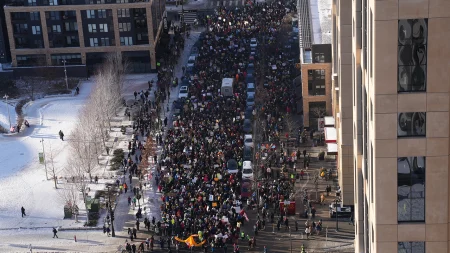Bangladesh Student Protests Reveal Deeper Economic Discontent Across Asia
Economic Inequality Fuels Nationwide Unrest as Flood Relief Scandal Ignites Public Outrage
In the rain-soaked streets of Dhaka, what began as isolated demonstrations against alleged corruption in flood relief distribution has exploded into Bangladesh’s most significant civil uprising in years. Thousands of university students have mobilized across the country, their voices rising above monsoon downpours to demand accountability from a government they claim has betrayed public trust. The catalyst: credible allegations that officials diverted millions in emergency funds meant for flood victims into private accounts, leaving displaced families without essential support during one of the worst flooding seasons in recent memory.
“We watched as our neighbors lost everything to the floodwaters, only to be abandoned by the very system meant to protect them,” said Farida Rahman, a 22-year-old student organizer from Dhaka University, her voice steady despite days of protests. “This isn’t just about missing money—it’s about a broken promise to the most vulnerable.” The demonstrations, which began on university campuses before spreading to secondary schools and public squares nationwide, represent a watershed moment in Bangladesh’s ongoing struggle with governance and transparency. Independent analysts estimate that up to 40 percent of allocated flood relief funds failed to reach intended recipients in hard-hit northern districts, where thousands remain in temporary shelters months after devastating floods swept away homes, livestock, and livelihoods.
The situation in Bangladesh mirrors a broader pattern of economic discontent sweeping across Asia, where rapid development has created stark divisions between those benefiting from economic growth and those left behind. From Manila to Mumbai, young people are increasingly vocal about systemic inequality, using social media to coordinate demonstrations that transcend traditional political boundaries. “What we’re witnessing is a generational awakening,” explains Dr. Samina Ahmed, professor of political economy at the Asian Development Institute. “These students have grown up in the digital age, with unprecedented access to information about both corruption at home and standards of accountability abroad. They’re measuring their institutions against global benchmarks and finding them wanting.”
Corruption Allegations Expose Governance Failures Amid Climate Vulnerability
The flood relief scandal has struck a particularly sensitive nerve in Bangladesh, a country where climate vulnerability and economic inequality intersect with devastating consequences. When historic flooding hit the northern regions in June, the government announced a comprehensive relief package worth approximately $250 million, promising immediate cash transfers to affected families and funds to rebuild critical infrastructure. Yet by August, investigative journalists had uncovered systematic discrepancies between allocated and distributed funds, publishing evidence suggesting high-ranking officials had diverted substantial portions into personal accounts through a network of shell companies and fictional beneficiaries.
Prime Minister’s Office spokesperson Rahman Chowdhury initially dismissed these allegations as “politically motivated fabrications,” but was forced to change course when financial documents leaked by a whistleblower within the National Disaster Management Authority corroborated the journalists’ findings. The government has since announced an official investigation, though protesters remain skeptical about its independence. “We’ve seen these ‘investigations’ before,” said Mahmud Hassan, a protest coordinator in Chittagong. “They’re designed to buy time until public attention shifts elsewhere. But we won’t be distracted this time—too many lives have been ruined.” The scandal has highlighted Bangladesh’s persistent challenges with governance transparency, particularly in disaster response systems that climate experts warn will face increasing pressure as global warming intensifies the monsoon cycle.
International observers note that the protests represent more than just anger over a single corruption case. “Bangladesh has achieved remarkable economic growth over the past decade, but the benefits have been unevenly distributed,” explains Sarah Tompkins, South Asia analyst for the Economic Development Forum. “Urban professionals have seen their prospects improve dramatically, while rural communities—especially those on the frontlines of climate change—face increasing precarity. The flood relief scandal simply crystallized this broader inequity into a specific, undeniable example.” This observation is supported by recent economic data showing that while Bangladesh’s GDP has grown at an average annual rate of 6.5 percent since 2010, the country’s Gini coefficient—a measure of income inequality—has worsened by nearly 12 percent during the same period.
Youth-Led Movement Transforms Political Landscape Through Digital Organization
What distinguishes the current wave of protests from previous movements is their sophisticated organization and technological savvy. Student coordinators have leveraged social media platforms to circumvent traditional information controls, creating decentralized leadership structures that have proven remarkably resilient against government attempts to identify and pressure specific organizers. When authorities restricted internet access in university districts, protesters quickly adapted by implementing mesh networking applications that allow communication without cellular infrastructure—technology first popularized during pro-democracy movements in Hong Kong and Thailand.
“This generation has created an entirely new protest playbook,” notes Dr. Akash Gupta, who studies social movements at Singapore National University. “They’re fluent in both the language of traditional Bangladeshi political discourse and the techniques of global digital activism. That combination makes them extraordinarily difficult for authorities to counter through conventional means.” This technological advantage has allowed protesters to maintain momentum despite increasingly forceful government responses, including the deployment of riot police to major universities and the temporary suspension of classes at several institutions. When security forces used water cannons against demonstrators outside the National Parliament building last Thursday, students responded by livestreaming the confrontation to international audiences, garnering support from human rights organizations and diaspora communities worldwide.
The movement has also displayed remarkable inclusivity across Bangladesh’s sometimes fractious social divisions. “I’ve been organizing for twenty years, and I’ve never seen this level of unity,” said Jahanara Begum, a veteran labor activist who has joined the student protests. “We have religious conservatives standing alongside secular progressives, rural students joining hands with urban elites. The shared experience of economic betrayal has transcended Bangladesh’s traditional fault lines.” This solidarity extends beyond students to include teachers’ associations, civil society organizations, and professional groups, who have issued statements of support and participated in coordinated work stoppages. Even traditionally government-aligned business associations have called for transparent investigations, reflecting concern that prolonged instability could damage Bangladesh’s carefully cultivated image as a stable investment destination.
Regional Pattern Emerges as Economic Disillusionment Spreads Across Asian Nations
Bangladesh’s demonstrations exist within a broader regional context of growing economic disillusionment. Similar movements have emerged in Pakistan, where inflation has eroded middle-class security; in Sri Lanka, where financial mismanagement triggered economic collapse; and in Thailand, where young people increasingly question the concentration of wealth among political and business elites. These parallel movements suggest a regional reckoning with development models that prioritized GDP growth over equitable distribution of resources and opportunities.
“We’re seeing the limitations of the ‘growth first, distribution later’ approach that dominated Asian economic planning for decades,” explains economist Dr. Hiroshi Tanaka from the Regional Development Bank. “Countries achieved impressive macroeconomic statistics, but the promised trickle-down effects have been insufficient to meet rising expectations, particularly among educated youth.” These expectations have been shaped by unprecedented access to global information flows, allowing young Asians to compare their circumstances not just with previous generations but with international peers. The resulting perception gap between economic possibilities and lived realities has fueled a profound sense of injustice that transcends national boundaries.
Climate vulnerability adds another dimension to this regional discontent. Many of Asia’s fastest-growing economies are also among the most exposed to climate change impacts, creating a double burden of adaptation costs and disaster recovery that disproportionately affects lower-income communities. “When corruption diverts resources from climate resilience, it’s not just an economic crime but an existential threat,” said climate policy expert Dr. Mei Lin Wang. “Young people understand this connection intuitively—they know their futures depend on both economic fairness and environmental protection.” This perspective helps explain why the Bangladesh flood relief scandal resonated so powerfully with the country’s youth, who recognize that corruption in disaster response represents a threat to their collective future in an increasingly climate-unstable world.
Path Forward Requires Fundamental Governance Reforms Beyond Immediate Crisis
As Bangladesh enters its third week of demonstrations, attention is turning to possible resolutions. Government officials have offered concessions, including the suspension of three senior disaster management officials and promises of reformed oversight mechanisms for relief funds. Protest leaders, however, maintain these steps address symptoms rather than underlying causes. “We need systematic change, not scapegoats,” declared student coalition spokesperson Taslima Rahman at a rally attended by an estimated 50,000 people in Dhaka’s central square. “True accountability requires independent anti-corruption institutions with real investigative powers and protection for whistleblowers.”
International development partners have echoed these calls for structural reforms, with several major donors announcing reviews of their funding protocols for projects involving government implementation. “We cannot continue business as usual while questions remain about financial governance,” stated the European Development Consortium in a diplomatic but pointed statement issued Monday. The World Bank similarly announced it would require enhanced transparency measures for a pending $500 million infrastructure resilience package, including third-party monitoring of disbursements and community oversight committees. These external pressures add significant weight to domestic reform demands, creating what political analyst Zafar Iqbal describes as “a perfect storm for governance transformation.”
For ordinary Bangladeshis, particularly those still awaiting help after the floods, the outcome of this movement will determine not just political arrangements but immediate quality of life. “I don’t care about politics,” said Mohammed Rahim, a farmer who lost his home and crops to floodwaters in Sylhet province. “I care about building a safe place for my children before the next monsoon. If students fighting in Dhaka can make that happen, they have my blessing.” His sentiment captures the fundamental stakes of Bangladesh’s unfolding crisis: a test of whether public institutions can deliver essential services with fairness and transparency in an era of increasing climate challenges and economic expectations. As similar questions echo across Asian societies, the resolution in Bangladesh may offer important lessons for a region in transition.







